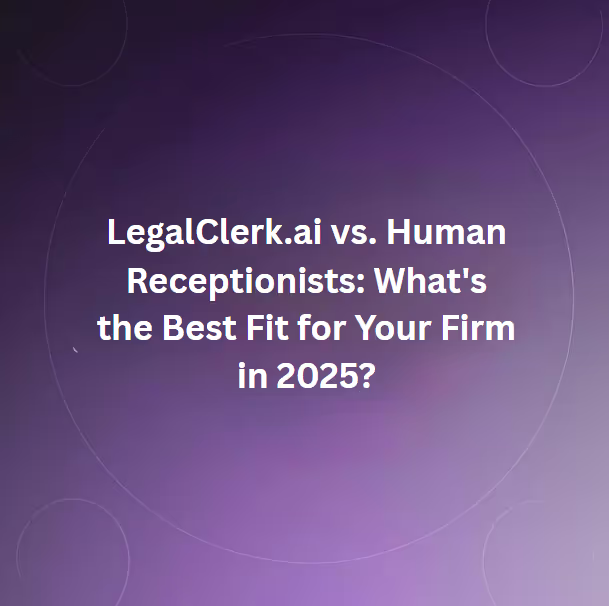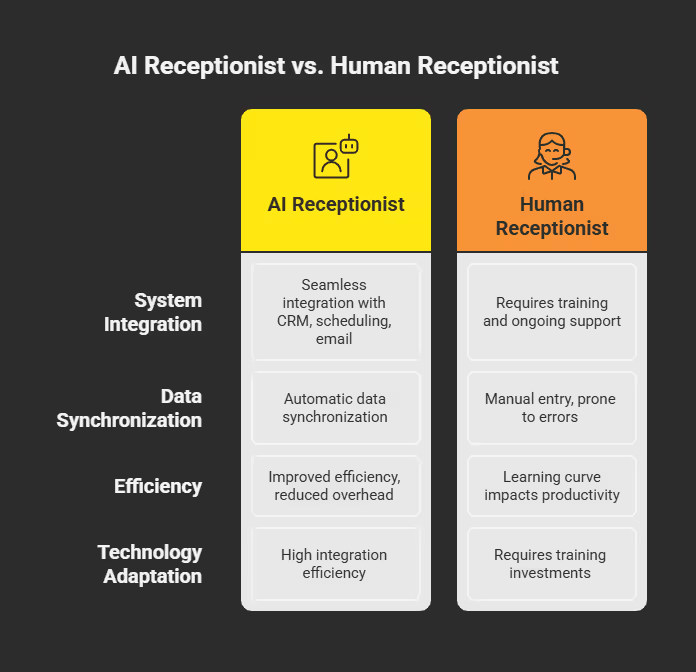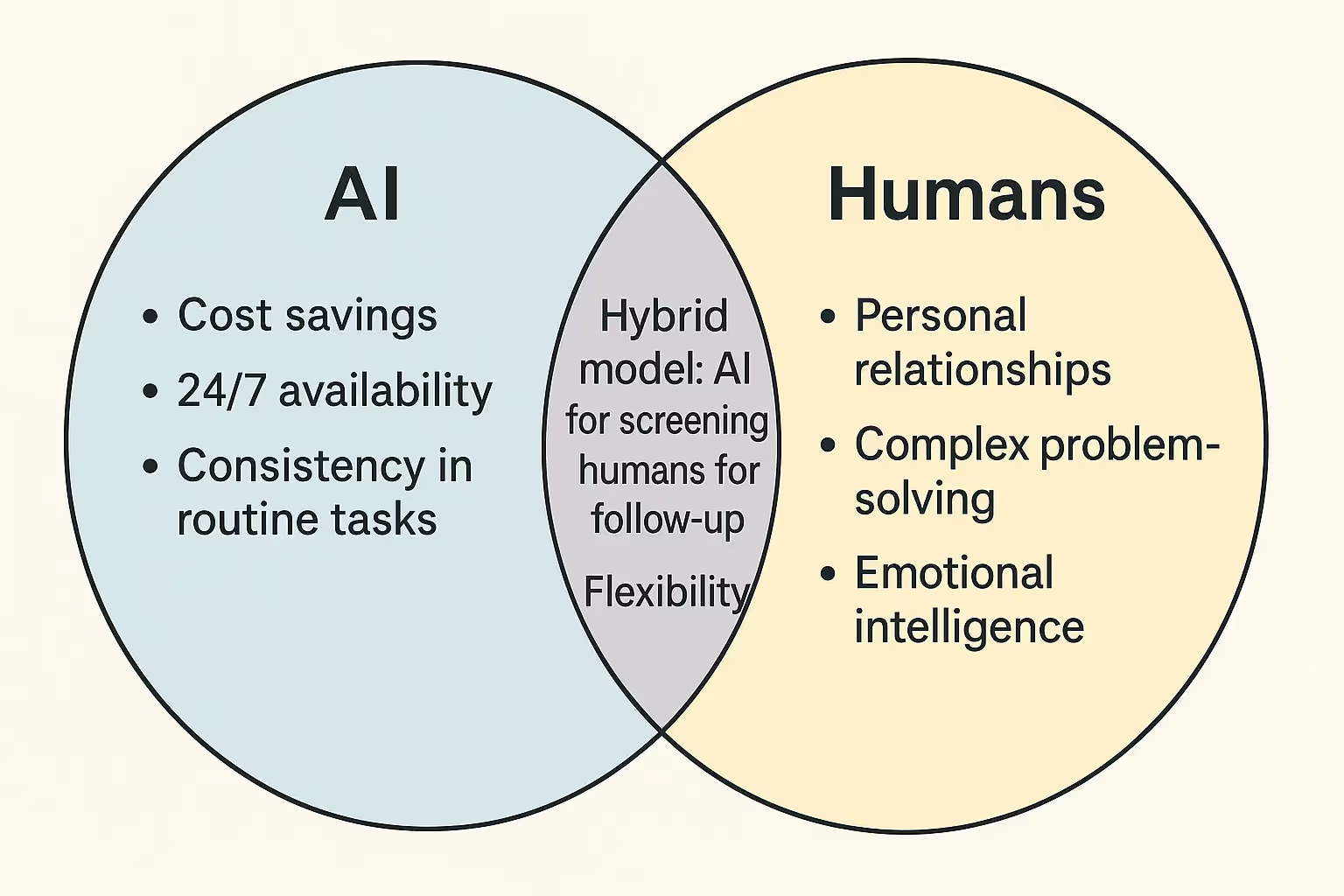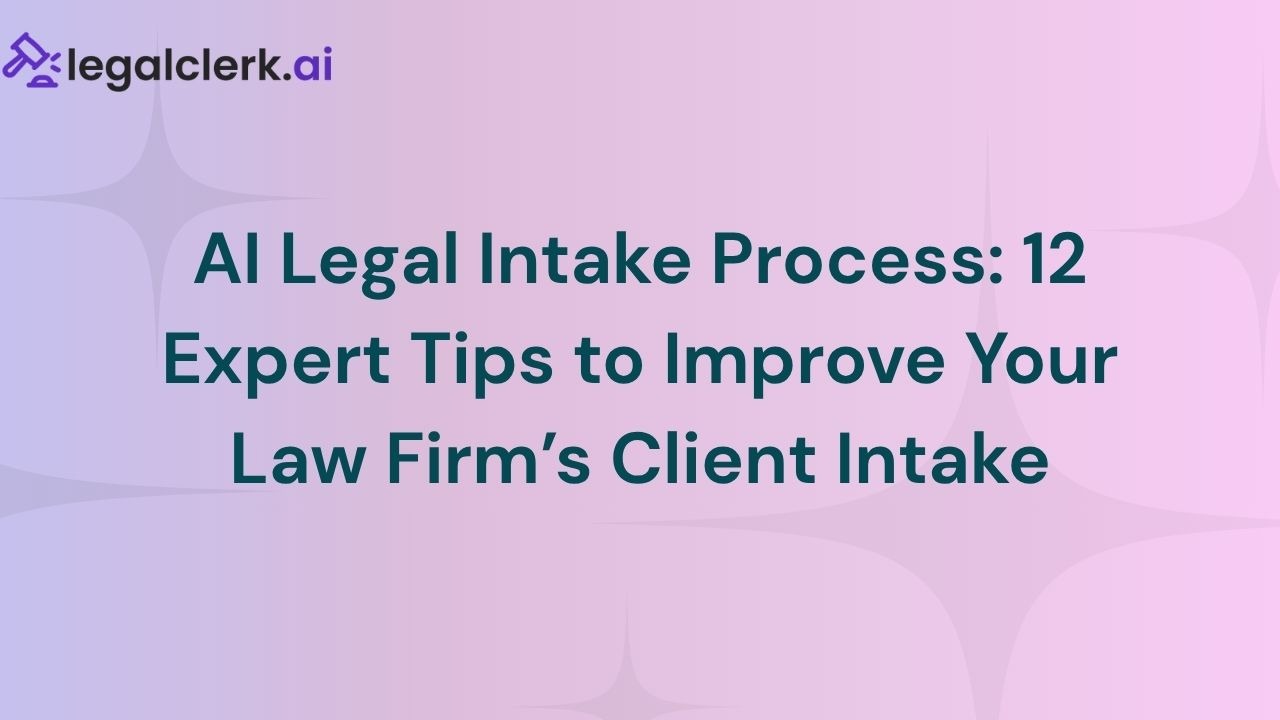LegalClerk.ai vs. Human Receptionists: What's the Best Fit for Your Firm in 2025?
This blog post compares LegalClerk.ai's AI-powered virtual receptionist services with traditional human receptionists for law firms. It examines cost-effectiveness, availability, consistency, and overall value to help legal professionals make informed decisions about their client intake and reception needs in 2025.

In 2025, law firms are at a crossroads: should they stick with the traditional human receptionist, or is it time to explore AI-powered solutions like LegalClerk.ai? Human receptionists have long provided the personal touch, but their high costs, including salaries, benefits, and training, are becoming harder to sustain. Many law firms also face the issue of incoming calls going unanswered, leading to missed opportunities and lost revenue.
The AI virtual receptionist for law firms offers 24/7 AI legal reception, handling legal intake automation, multilingual support, and seamless client interactions at a fraction of the cost. Unlike human receptionists, AI systems don’t require breaks, and they can manage a higher volume of calls without the risk of burnout or mistakes.
So, what's the right fit for your firm, AI receptionist vs human for legal practice?
1. Cost Comparison for Law Firms: AI Receptionist vs Human
Money matters for law firms. Human staff costs more than AI. A full-time human earns $35,000 to $50,000 per year. After adding benefits and training, your total cost reaches $60,000 to $80,000 yearly. This covers only day hours. You need staff for 24/7 phone coverage, night shifts, weekend overtime, and holiday premiums, all add up to the cost.
LegalClerk.ai works differently. Our clear pricing shows big savings over human staff. AI works all day without overtime pay. The math is simple. AI costs 60-80% less than humans. It also works better for hours, no sick days, vacation time, and personal emergencies that disrupt service.
2. 24/7 Availability: AI vs Human Coverage
Clients call when they need help, which can happen at any time, day or night. Unfortunately, human staff can’t always answer. They work set hours, take breaks, and go on vacation. After hours, calls often go to voicemail, leading to missed opportunities as clients hang up and contact other firms.
Emergencies don’t wait. Car accidents happen at night, legal crises arise on weekends, and personal injury cases need immediate responses. Studies show that 80% of callers won’t leave a message; they want quick answers. Missing calls means lost revenue. Each missed call could be worth thousands.
AI legal receptionists, like LegalClerk.ai, are available 24/7, answering every call instantly. No holidays, no sick days, and no breaks. This constant availability helps firms catch leads that would otherwise slip away. Round-the-clock service builds trust, clients feel supported and know that help is always there, which leads to more referrals.
3. Consistency in Client Experience
Human work varies daily. Stress and mood can affect service; one person might be cheerful and helpful, while another sounds rushed. Monday mornings are tough, and Friday afternoons bring fatigue. Personal problems can impact performance, and health issues affect consistency. Training helps, but it’s hard to maintain the same quality. New staff need time to learn, and when someone leaves, training starts over.
AI, however, provides the same service every time. AI like LegalClerk.ai follows scripts perfectly, with no bad days to impact performance. It delivers steady, professional interactions that align with your firm's style. Every caller gets the same great experience.
4. Scalability and Call Handling Capacity
As your business grows, so do the calls. More calls mean more staff, but hiring takes time, and during busy periods, calls go missed. Humans can only handle 20-30 calls per hour, and tough questions slow them down. When multiple tasks pile up, performance suffers. Peak times, like after marketing campaigns or media coverage, overwhelm staff. They can't keep up with sudden spikes.
AI, on the other hand, scales instantly. It manages an endless number of calls at once, with no delays in hiring. As your firm grows, AI legal intake solutions like LegalClerk.ai ensure phone service isn’t impacted. Seasonal changes, like holidays, summer vacations, or flu season, don’t disrupt service. AI provides consistent coverage year-round. Expansion to new markets is easy, AI handles support across locations without local hiring, maintaining high-quality service everywhere.
5. Where Human Receptionists Excel
AI can't replace all human skills. People offer real care during hard times. They read feelings and change how they respond. Emotional situations need human warmth. Divorce cases require empathy, personal injury victims need comfort, and criminal matters demand sensitivity. Hard situations need human thinking. Strange requests or sensitive matters need personal care. Cultural differences matter, and language nuances are important. Local customs affect communication, and humans adapt to these needs better.
Some clients want to talk to people. They like the personal link. This varies by age and law type, such as older clients prefer human contact, complex cases need detailed discussion, high-value matters deserve personal attention, and VIP clients expect human service. Humans can judge situations. They know when to escalate calls. Problem-solving skills help with difficult cases. Creativity solves unique challenges. Relationship building takes time, trust develops through interaction, personal connections create loyalty, and long-term clients value familiar voices.
6. Technology, Integration & Efficiency
Law firms use many software systems to manage case files, scheduling, and billing. Humans need training on each system. They make data mistakes and system updates need more training. Manual data entry creates errors and information gets lost sometimes. Updates also take valuable time.
AI works smoothly with legal software. They update case files by themselves. No training needed for new features. The future of legal intake includes smart systems that reduce office work. Automatic data capture saves time, information flows between systems, no duplicate entry is needed, and accuracy improves dramatically. Integration reduces costs. Less manual work is needed. Staff focus on important tasks, and efficiency gains boost profits.

7. Security & Compliance Considerations
Legal work demands strict security to protect client information. Data breaches can cost millions, and the damage to a firm’s reputation can last for years. Human staff, however, can make mistakes. They might share incorrect information, email errors happen, and physical documents can be misplaced.
AI systems, like LegalClerk.ai, provide robust security. Data encryption ensures that sensitive information is protected, while access controls limit who can view it. Audit trails track all activity, ensuring complete transparency.
Compliance in the legal field is complex, with HIPAA impacting health law and attorney-client privilege requiring protection. Different states have varying rules, making compliance even more challenging. Training human staff on compliance takes time, and rules change frequently, which can lead to costly mistakes and potential liability.
8. Client Demographics and Preferences
Different clients have different needs. Age affects technology comfort. Practice areas influence expectations. Geographic location matters too. Young clients prefer digital interaction. They use smartphones constantly. Quick responses matter most. Technology feels natural to them. Business clients value efficiency. They want fast service. Professional tone is important. Results matter more than relationships.
Older clients like personal service. They prefer phone calls to texts. Human interaction builds comfort. Patience is more important than speed. Rural clients have different expectations. Personal relationships matter more. Community connections influence choices. Word-of-mouth drives business. Urban clients want speed and convenience. They accept technology easily. Multiple communication channels are expected. Professional efficiency is valued.
Choosing the Right Legal Receptionist Solution: AI vs. Human for Your Law Firm
How to Switch from Human to AI Staff: A Step-by-Step Guide
- Start with Test Programs: Begin AI implementation during quiet times to reduce risk.
- Pilot Programs: Test AI on non-critical calls first, monitor its performance, and adjust settings as needed.
- Train Your Staff: Ensure staff are trained on the new systems and know how to manage handoffs between AI and human staff.
- Change Management: Communicate openly with staff to address resistance, and provide training to build confidence in the new system.
- Consider More Than Price: When choosing an AI solution, focus on integration, customization, and customer support.
- Timeline Planning: Avoid rushing the transition; gradual rollouts allow for testing phases to catch issues early.
- Backup Plans: Prepare for technical problems by ensuring human staff can provide coverage and redundancy to ensure continuity.
Making Your Decision: AI vs. Human Staff

Conclusion
LegalClerk.ai changes legal reception by mixing low cost with professional service. While humans offer a personal touch, AI gives consistency and availability that humans cannot match. The legal world is changing. Firms that use good technology gain advantages. AI voice agents save time and cut costs while keeping service quality.
Your firm's future depends on smart technology choices. Think about your needs, budget limits, and growth plans. The right reception solution supports your success in 2025 and beyond. Ready to try AI reception for your firm? Research options well, test different services, and make choices based on facts, not guesses. Your clients deserve the best service, whether from humans or AI.
FAQs
Should law firms use AI receptionists?
Yes, law firms can greatly benefit from using an AI legal receptionist like LegalClerk.ai. AI receptionists provide 24/7 availability, automated legal intake, and efficient client interactions.
AI vs human receptionist: which is better?
The choice depends on your firm’s needs. LegalClerk.ai offers cost-effective, 24/7 service ideal for routine tasks and high call volumes. However, for complex legal matters or sensitive cases, human receptionists excel.
How much does an AI legal receptionist cost?
The cost of an AI legal receptionist like LegalClerk.ai is generally much lower than hiring a human receptionist. Prices vary, but AI solutions typically offer a flat monthly rate with no hidden costs.
Recent Blogs
FAQs: Everything You’re Wondering About Your AI Receptionist
Absolutely. Whether you need a full-time law firm answering service or just support during off-hours, LegalClerk adjusts to your needs. You control when the AI receptionist picks up.
Yes. LegalClerk is built specifically for law firms. It knows how to handle legal intake questions, understands terminology by practice area, and never misses a required field or form detail.
Yes. Our AI legal receptionist uses advanced natural language processing and human-like voice tech to deliver a warm, responsive client experience. Most callers can’t tell it is AI — and that’s by design.
Yes. LegalClerk connects with tools like Clio, Lawmatics, Google Calendar, Calendly, and more. New leads, appointments, and intake summaries are automatically synced.
Yes. LegalClerk offers multilingual legal receptionist support, allowing you to serve a broader range of clients with accurate, translated intake flows.
Completely. LegalClerk uses HIPAA-grade encryption, secure storage, and detailed access logging. Every call and submission is protected and fully auditable.

.avif)
3.jpg)


.jpg)